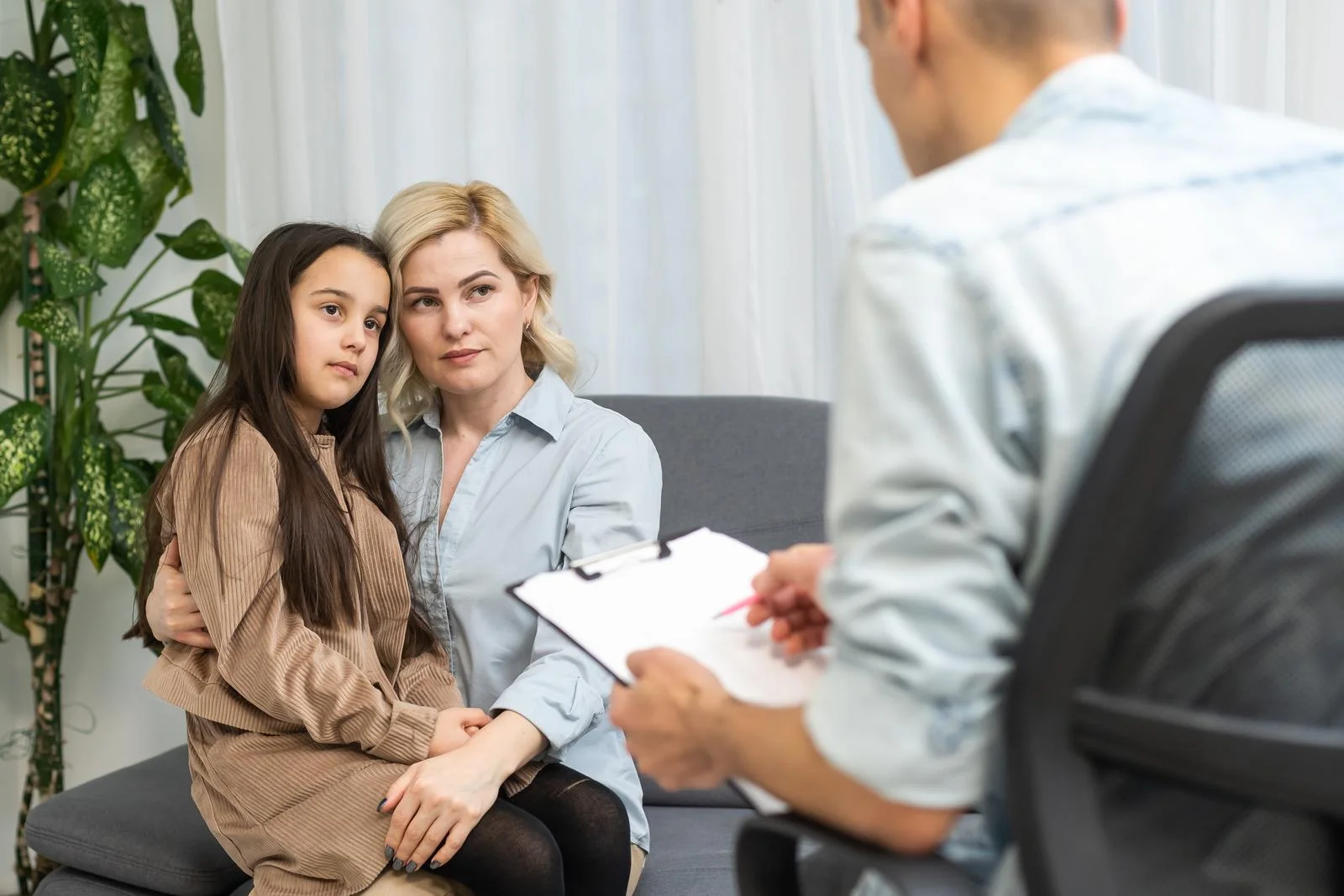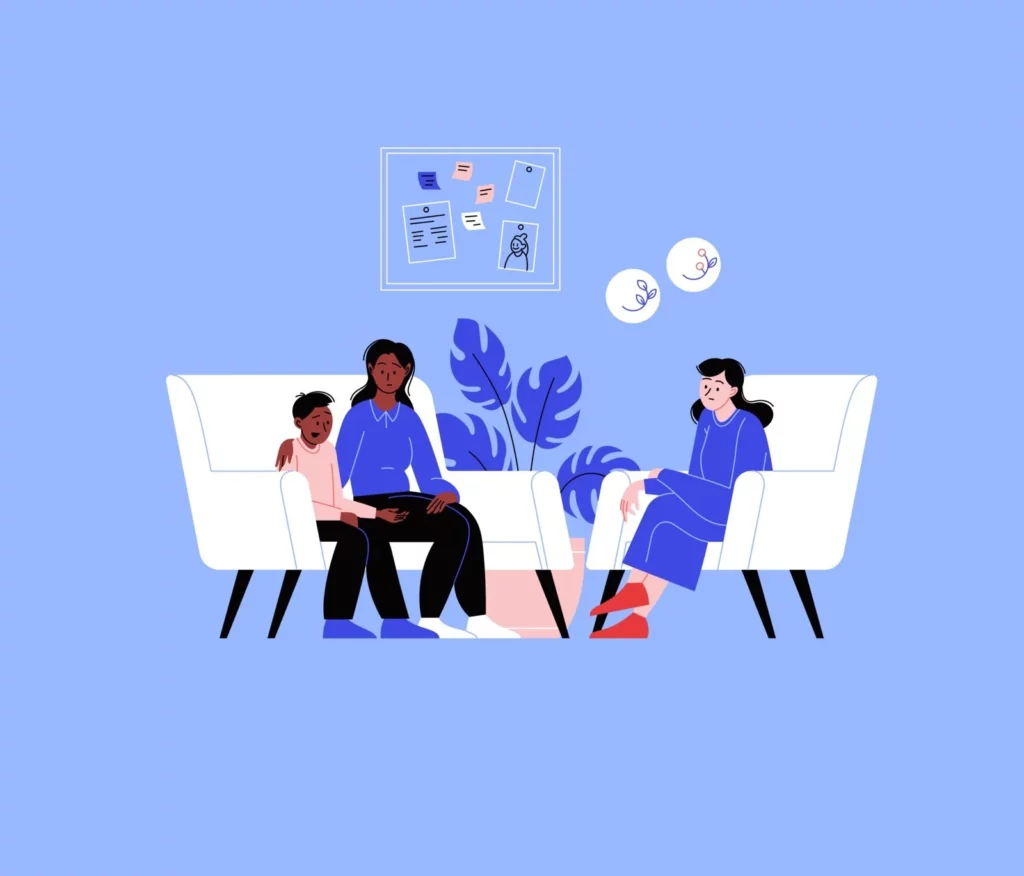Child Psychiatry
Child psychiatrists are licensed healthcare professionals with specialized expertise in addressing the unique emotional and psychological needs of children and adolescents. At Good Health, our team of child psychiatrists are dedicated to supporting the mental well-being of young individuals and their families. With a deep understanding of child development, disorders, and emotional disruptions, our experts utilize their skills to foster positive growth and transformation.
Our child psychiatrists adopt a psychodynamic-oriented approach to assessment and treatment, delving into the inner thoughts, emotions, and perceptions of the child. This approach also encompasses how children view and interact with their surroundings. By observing patterns that hinder healthy development and engaging in respectful communication, our therapists guide children and families toward positive changes.

Child Psychiatry Process Steps
Step 1
Building Trust and Connection
After a comprehensive assessment and diagnosis, the journey toward healing begins. Our dedicated child psychiatrists prioritize establishing a strong rapport with the young patient. Through empathetic communication and compassionate engagement, our therapists create a secure space where the child can comfortably explore their challenges. This pivotal initial stage is crucial in shaping the therapeutic relationship and laying the groundwork for building trust.
Step 2
Engaging in Therapeutic Dialogue
As the therapeutic relationship strengthens, the child and therapist engage in open dialogue. Using effective communication strategies, the therapist encourages the child to express their thoughts, emotions, and concerns. This stage is essential for understanding the child’s perspective, addressing their difficulties, and fostering problem-solving skills. Our experienced therapists employ their expertise to connect with even the most resistant young patients.
Step 3
Setting Goals and Progress Tracking
The collaborative goal-setting stage involves developing targeted strategies to overcome obstacles that hinder the treatment goals. Achieving both short-term and long-term objectives is a key aspect of child psychiatry. Through ongoing sessions, the child and therapist acknowledge progress, encourage independence, and promote accountability. Some children may continue therapy as a preventative measure, focusing on ongoing mental well-being and personal growth.

Benefits of Child Psychiatry
Child psychiatry offers numerous benefits for children, adolescents, and their families. By enhancing self-awareness and interpersonal skills, psychotherapy identifies and addresses mental health concerns. Childhood and adolescence are critical developmental phases, and our specialized approach helps children manage emotions, build self-esteem, and develop coping mechanisms. The impact extends beyond the individual, benefiting the entire family dynamic. At Good Health, our child psychiatrists collaborate closely with parents to improve mood, self-esteem, and coping abilities, creating a brighter path toward mental well-being.
Navigating the complexities of childhood and adolescence is made easier with the support of Good Health’s expert child psychiatrists. We are dedicated to guiding young minds on their journey to emotional wellness, providing them with the tools they need to flourish and lead fulfilling lives.
FAQs
At what age can my kid see a child psychiatrist?
Child psychiatrists typically see patients ranging from infancy through adolescence, up to 18 years of age. However, the appropriate age often depends on the specific concerns and needs of the child.
When should I consider seeking help from a child psychiatrist for my child?
If you notice persistent changes in your child’s behavior, mood, or emotions that affect their daily life, relationships, or school performance, it might be time to consult a child psychiatrist. Warning signs can include sudden withdrawal, extreme mood swings, difficulties in concentration, intense fears, or significant changes in eating or sleeping patterns.
Will medication always be prescribed in child psychiatry?
No, medication is just one of many tools in child psychiatry. Therapeutic interventions, counseling, behavioral therapies, and parental guidance are often primary approaches. Medications might be considered if deemed necessary for the child’s well-being.
How long does a typical child psychiatry session last?
Typically, an initial assessment might last 60-90 minutes, allowing the psychiatrist to gather comprehensive information. Follow-up sessions usually last between 30-50 minutes, though this can vary based on the child’s needs.
Is it necessary for parents to be present during sessions?
While it’s often beneficial for parents to be involved, especially during initial assessments, some sessions may be one-on-one between the child and the psychiatrist to foster open communication. Parental participation is decided on a case-by-case basis.
Is child psychiatry covered by insurance?
Yes, child psychiatry services are often covered by health insurance plans. It’s important to check with your insurance provider to understand the extent of coverage and any specific requirements, such as referrals or pre-authorizations.
Don't hesitate to contact us
Have any questions?
Please complete the form below and we will get right back to you.